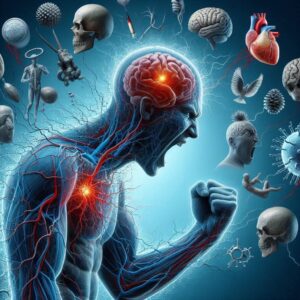Transform Your Anger: Unlock Constructive Pathways Through Therapy
Anger is a natural human emotion that everyone experiences throughout their life journey. This intense feeling can arise from various circumstances, including situations of intimidation, personal attacks, frustration, or feelings of betrayal, insult, or harm. Understanding the complex nature of anger is essential for personal development and emotional self-regulation. By identifying the roots and triggers of this powerful emotion, individuals can embark on a transformative journey toward healthier emotional responses and enhanced mental well-being. This exploration is pivotal in fostering resilience and emotional maturity, which are crucial for navigating life’s challenges.
Recognizing that feeling angry is not inherently negative is vital; the real challenge lies in how we manage and express this emotion. Expressions of anger can range from mild impatience and annoyance to deep resentment and explosive rage, each having different implications for our relationships and overall well-being. By developing a greater awareness of these emotional expressions, individuals can skillfully navigate their emotional landscape, fostering healthier interactions and cultivating more fulfilling relationships with others.
Physical symptoms of anger may manifest as a racing heart, elevated blood pressure, and heightened muscle tension. If these feelings go unaddressed, anger can escalate into destructive behaviors that adversely impact relationships, career opportunities, and overall life satisfaction. Recognizing the signs of anger and understanding its deeper causes are crucial steps toward effectively managing this powerful emotion, ensuring that it does not dictate one’s life choices or relationships.
Various triggers can ignite feelings of anger, stemming from external events, internal thoughts and feelings, or physiological reactions. By exploring these triggers, individuals can gain valuable insights into their anger, paving the path for the development of robust coping strategies. This deep dive into one’s emotional responses can significantly enhance personal growth and emotional intelligence, enabling individuals to proactively and constructively manage their feelings, especially during challenging situations.
Actionable Strategies for Mastering Effective Anger Management Techniques
- Recognize that anger is a natural emotional response that can evolve into problems if not managed properly.
- Unchecked anger can lead to severe repercussions for both mental and physical health, influencing overall quality of life.
- Participating in anger management therapy provides individuals with essential tools for addressing and handling anger constructively.
- Therapeutic practices introduce techniques such as deep breathing exercises and enhanced communication skills to tackle emotional challenges effectively.
- Therapy aids in identifying personal triggers and uncovering the deeper issues that often fuel anger responses.
 The Serious Health Consequences of Uncontrolled Anger
The Serious Health Consequences of Uncontrolled Anger
Examining the Physical Health Risks Linked to Chronic Anger
Extensive research has demonstrated a significant correlation between chronic anger and severe health complications. These can include ailments such as high blood pressure, cardiovascular diseases, and weakened immune systems, which substantially raise the risk of strokes and other serious medical emergencies. Furthermore, enduring anger may lead to debilitating conditions like irritable bowel syndrome, insomnia, and tension headaches, which can seriously disrupt daily functioning and impact overall health, leading to a diminished quality of life.
The Detrimental Effects of Uncontrolled Anger on Mental Health and Interpersonal Relationships
The repercussions of unmanaged anger extend far beyond physical health, posing significant challenges to mental well-being. Persistent anger can serve as a precursor to anxiety disorders, depression, and substance abuse issues. Additionally, it often results in strained relationships, creating conflicts and emotional distances that alienate family and friends. This cycle of isolation and emotional distress can be incredibly challenging to break, emphasizing the critical need for effective anger management strategies.
Recognizing the Necessity for Support: Building Essential Anger Management Skills
Understanding the harmful implications of uncontrolled anger on one's mental and physical health underscores the importance of seeking help and learning effective anger management strategies. Individuals must confront the reality that unchecked anger can jeopardize their overall well-being and quality of life. By comprehending the long-term effects of persistent anger, individuals may feel inspired to actively pursue constructive strategies and support systems that nurture healthy emotional expression and management.
Experience the Life-Changing Advantages of Anger Management Therapy
Participating in anger management therapy offers a wealth of benefits for those struggling with intense feelings of anger. One of the primary advantages is the opportunity to explore the underlying causes of their anger while acquiring practical coping techniques. During therapy, individuals can investigate their anger triggers, fostering a deeper understanding of their emotional responses and reactions. This journey of self-discovery is crucial for effective personal development.
Enhanced self-awareness is vital for developing effective anger management strategies. Therapy provides a safe and supportive environment for individuals to reflect on their emotions and learn healthier methods for expressing and coping with anger. Clients not only gain insights into their emotional states but also develop essential communication skills that can significantly improve relationships and reduce conflicts. By empowering individuals to regain control over their emotions, anger management therapy can lead to a more balanced, fulfilling life.
Moreover, anger management therapy plays a vital role in helping individuals break free from destructive behaviors often associated with uncontrolled anger. By interrupting harmful patterns, clients can reclaim control over their lives and foster healthier, more satisfying relationships. Through the implementation of effective coping strategies and stress management techniques, individuals can significantly mitigate the negative impacts of anger on their mental and physical health. Ultimately, the profound benefits of anger management therapy can lead to enduring positive changes in an individual’s life.
 Diverse Techniques and Strategies Offered in Anger Management Therapy
Diverse Techniques and Strategies Offered in Anger Management Therapy
Anger management therapy equips clients with a range of effective techniques and strategies for managing their anger constructively. One widely employed method involves deep breathing exercises, which help individuals regulate their physiological responses to anger while simultaneously alleviating stress and tension. Mindfulness meditation is another powerful technique presented in therapy, encouraging clients to focus on the present moment and enhance their awareness of thoughts and emotions.
Cognitive restructuring is a fundamental component of anger management therapy. This method involves identifying and challenging negative thought patterns, replacing them with more rational and balanced perspectives. By reframing their perceptions of triggering situations, individuals can learn to respond to anger more constructively. Additionally, therapy often includes problem-solving skills to assist clients in effectively addressing the root causes of their anger.
Furthermore, assertiveness training is frequently integrated into anger management therapy, empowering individuals to express their needs and establish healthy boundaries respectfully. Those who master these techniques and strategies in therapy develop a versatile toolkit for managing their anger in various contexts, enhancing their adaptability and emotional resilience.
Delving Into: Understanding Triggers and Roots of Anger Through Therapeutic Exploration
Therapeutic sessions provide individuals with the opportunity to explore specific triggers and underlying issues that contribute to their anger. By reflecting on various situations, thoughts, and emotions, clients can gain valuable insights into what incites their anger. Recognizing these triggers enables individuals to identify early warning signs before they escalate into uncontrollable rage, thereby fostering better emotional management.
Therapy serves as an essential resource for those aiming to pinpoint their anger triggers and address the core issues fueling these feelings. This process may involve examining past experiences, traumas, or learned behaviors that shape one’s emotional responses. Effectively confronting these underlying factors can lead to significant breakthroughs in healing emotional wounds, ultimately fostering a sense of peace and emotional stability.
In a therapeutic environment, individuals are offered a safe space to explore their triggers and underlying concerns without fear of judgment or criticism. This journey of self-exploration can be incredibly empowering, equipping clients with the tools necessary for managing and channeling their anger in healthy and constructive ways.
The Essential Role of Cognitive Behavioral Therapy in Effective Anger Management
Confronting and Replacing Irrational Beliefs to Encourage Rational Thinking
Cognitive Behavioral Therapy (CBT) aims to confront irrational beliefs and replace them with logical, balanced thought processes. By identifying and addressing these cognitive distortions, individuals can cultivate a more constructive and realistic perspective on situations that trigger their anger, fostering healthier emotional responses and reactions.
Acquiring Practical Strategies for Everyday Anger Management
Beyond recognizing cognitive distortions, CBT empowers individuals with practical coping strategies for effectively managing anger. Techniques such as relaxation exercises, assertiveness training, and problem-solving skills are essential for addressing the root causes of anger. These strategies provide individuals with actionable tools that can be applied in everyday situations, helping them to regulate and manage their emotional responses more effectively.
Enhancing Self-Awareness for Better Emotional Regulation
Moreover, CBT enhances self-awareness by helping individuals understand the connections between their thoughts, emotions, and behaviors. By gaining clarity on these relationships, individuals are better equipped to manage their emotional reactions to anger-triggering situations. Mastering effective anger management is essential for fostering emotional regulation and overall well-being. Cognitive Behavioral Therapy plays a significant role in this process, equipping individuals with the skills necessary to navigate their anger and improve their overall quality of life.
 Ensuring Lasting Success: Ongoing Support and Resources After Therapy
Ensuring Lasting Success: Ongoing Support and Resources After Therapy
For those who have completed anger management therapy, continuing to seek support and utilize resources is crucial for sustaining personal growth. To further enhance their anger management skills, individuals might consider joining support groups or participating in one-on-one counseling sessions. Support groups provide an excellent opportunity to connect with others facing similar challenges, fostering a sense of community and empathy. These groups create a nurturing space for sharing experiences and learning from one another, significantly diminishing feelings of isolation and promoting a sense of belonging.
In addition to ongoing support, individuals can access various resources, including self-help books, online platforms, and mobile applications designed to facilitate effective anger management. These tools offer additional strategies and methods for practicing healthy coping mechanisms outside of therapy sessions. Moreover, maintaining progress after therapy may require lifestyle adjustments that promote overall well-being, such as regular physical activity, balanced nutrition, adequate sleep, and stress-reduction practices.
Incorporating these lifestyle changes into daily routines can significantly reduce the likelihood of experiencing overwhelming anger. Understanding and managing the powerful emotion of anger is essential for maintaining personal control and emotional health. The consequences of uncontrolled anger can severely impact both mental and physical health, underscoring the necessity of seeking help through anger management therapy. This comprehensive understanding equips individuals with the knowledge and strategies needed to navigate their emotions effectively.
Therapy serves as a vital resource for individuals grappling with the complexities of uncontrolled anger. It empowers them to comprehend their emotional triggers, confront underlying issues, and acquire practical strategies while providing the necessary support for sustained progress. By equipping individuals with the knowledge and tools to manage their anger effectively, therapy fosters healthier coping mechanisms and enhances overall emotional well-being.
Presented By:
References
- Teen Addiction Treatment Ames Iowa | Ember Recovery. https://emberrecovery.org/teen-addiction-treatment-in-iowa/
- Why Men Should Not Cover Up Their Emotional Distress | TheBeardMag. https://www.thebeardmag.com/lifestyle/health/why-men-should-not-cover-up-their-emotional-distress/
The Article: Interventions for Anger Management appeared first on Anger Management Leyland.
The Article Managing Anger: Proven Strategies for Success appeared first on https://mcrtherapies.com
The Article Proven Strategies for Success in Managing Anger Was Found On https://limitsofstrategy.com




Comments are closed